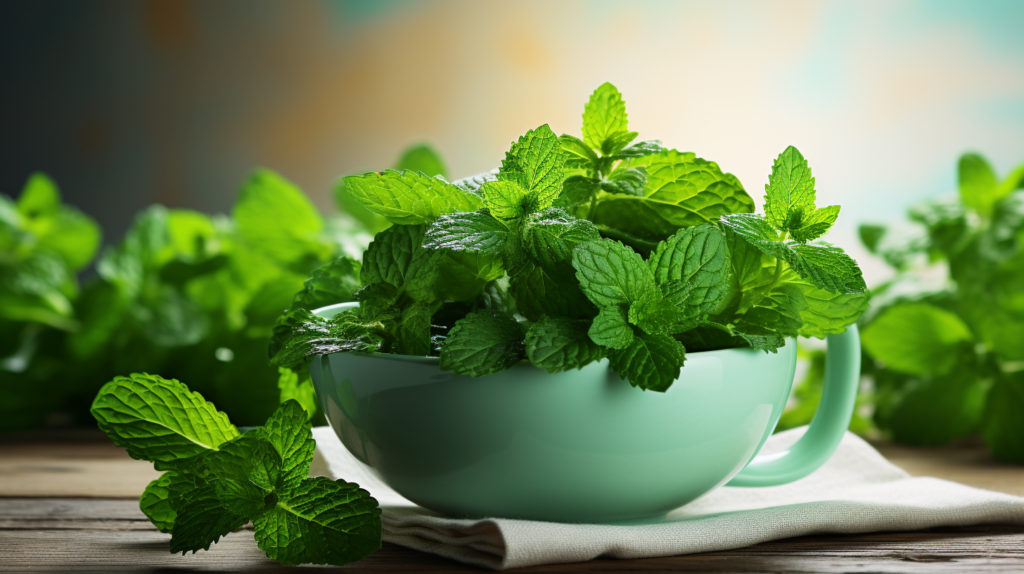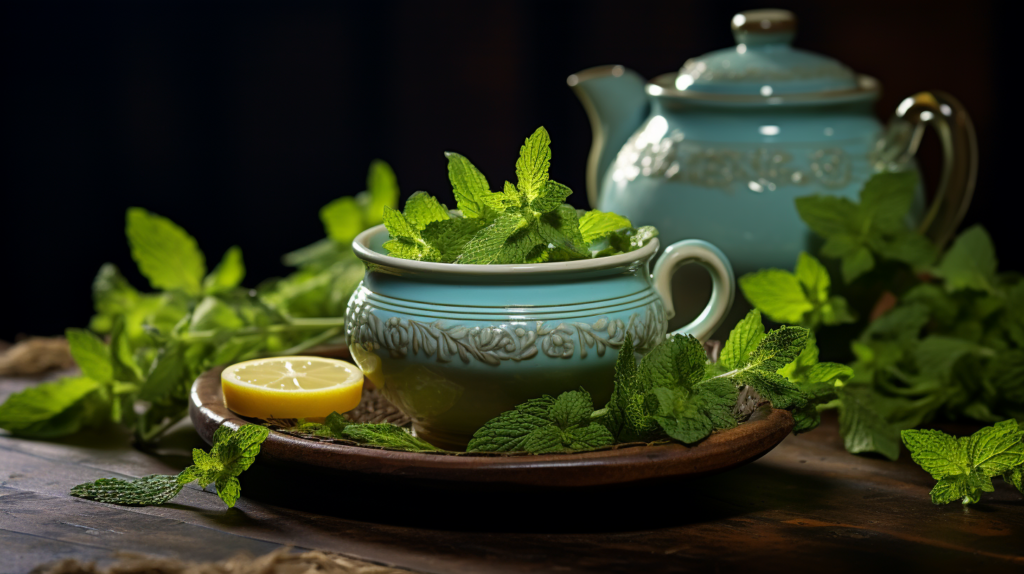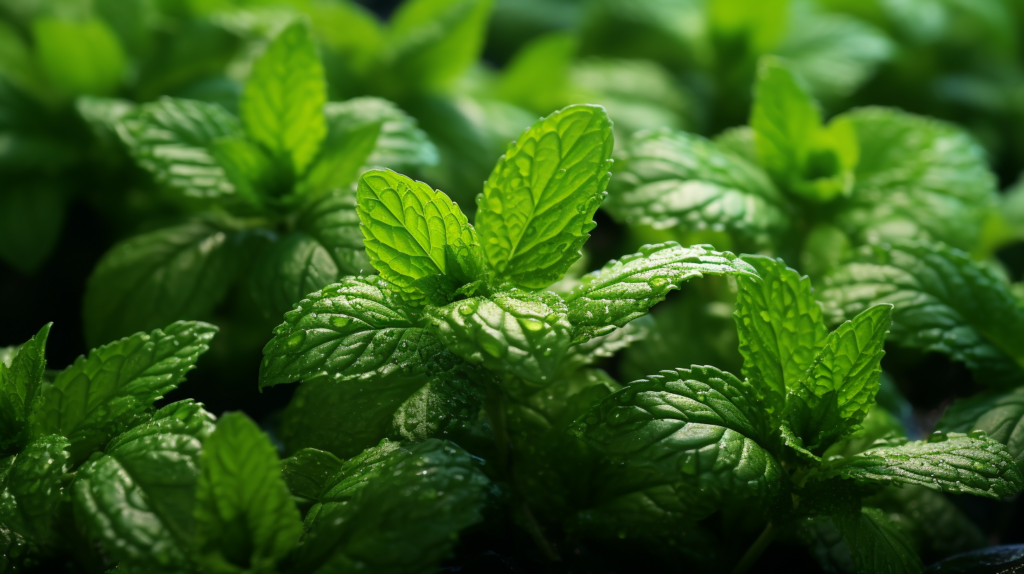If you’re looking for a natural way to improve your digestive health, look no further than peppermint tea. The refreshing brew has been used for centuries for its soothing effects on the digestive system. But did you know that drinking peppermint tea daily can have numerous long-term benefits for your digestive health?
In this section, we will explore the various digestive benefits that come with incorporating peppermint tea into your daily routine. From alleviating symptoms of indigestion to promoting healthy bowel movements, you’ll discover just how powerful this humble herbal tea can be.
Key Takeaways
- Peppermint tea has been used for centuries for its soothing effects on the digestive system.
- Drinking peppermint tea daily can provide numerous long-term benefits for your digestive health.
- Peppermint tea can alleviate symptoms of indigestion, bloating, and gas, making it an effective digestive remedy.
- Peppermint tea can improve overall digestion, including aiding in the digestion of fats and promoting healthy bowel movements.
- Peppermint tea contains compounds that possess healing properties specifically beneficial for digestive health.

The Soothing Effects of Peppermint Tea on Digestion
If you’re looking for a natural digestive aid, look no further than peppermint tea. For centuries, people have been using peppermint tea to ease various digestive problems, including gas, bloating, and indigestion. Peppermint contains menthol, a compound that can help relax the muscles in the digestive tract, soothing spasms and cramps that can cause discomfort.
Why Peppermint Tea is an Effective Natural Digestive Aid
Peppermint tea has several properties that make it an ideal natural digestive aid. Here are a few reasons peppermint tea can be so effective:
- Relaxant: One of the main compounds found in peppermint tea, menthol, has a relaxing effect on the muscles in the digestive tract, which helps reduce cramping and spasms.
- Antispasmodic: The essential oils in peppermint have antispasmodic properties, which help calm the muscles in the digestive tract and reduce pain and discomfort.
- Carminative: Peppermint tea has been shown to have carminative properties, which help reduce gas and bloating in the digestive system.
How Peppermint Tea Can Provide Relief from Digestive Issues
Peppermint tea can be a natural remedy for a variety of digestive issues. Here are a few examples:
“Peppermint oil has been shown to help reduce symptoms of irritable bowel syndrome (IBS), including abdominal pain and bloating.”
In a study published in the British Medical Journal, researchers found that peppermint oil was more effective at reducing IBS symptoms than a placebo.
“Peppermint tea can help relieve symptoms of indigestion, including bloating, gas, and nausea.”
In a study published in the Journal of Gastroenterology and Hepatology, participants who consumed peppermint oil before a meal experienced less indigestion than those who didn’t.
Incorporating Peppermint Tea into Your Daily Routine
To reap the digestive benefits of peppermint tea, consider incorporating it into your daily routine. You can drink a cup in the morning or after a meal to soothe your digestive system. It’s important to note that while peppermint tea is generally safe for most people, it can interact with certain medications and can cause side effects in some people, such as heartburn or allergic reactions. If you have any concerns, talk to your doctor before adding peppermint tea to your diet.

Peppermint Tea as a Digestive Remedy
If you’re seeking a natural remedy to soothe your digestive issues, peppermint tea could be just what you need. The soothing digestive effects of peppermint tea have been celebrated for centuries, making it a go-to for those seeking a gentle solution for their digestive woes.
The natural properties of peppermint tea can help alleviate symptoms of indigestion, bloating, and gas, making it a highly effective digestive remedy. In fact, a study published in the Journal of Gastroenterology found that peppermint oil capsules were effective in reducing symptoms of irritable bowel syndrome (IBS) in patients, with few side effects.
Peppermint tea is known for its antispasmodic properties, meaning it can help to relax the muscles of the digestive tract, reducing cramping and discomfort. It also has a calming effect on the digestive system, which can ease feelings of nausea and promote overall digestive health.
Tip: For even greater digestive benefits, try sipping on warm peppermint tea after a meal. It can help to stimulate bile flow and aid in the digestion of fats.
Improving Digestion with Peppermint Tea
If you’re looking for a natural way to improve your digestion, peppermint tea may be just what you need. This refreshing brew has been used for centuries to promote digestive health, and modern research has confirmed its effectiveness in aiding digestion.
Peppermint tea can help to improve digestion in a number of ways. Firstly, it contains compounds that stimulate the production of digestive enzymes, which help to break down food more effectively. This can be particularly helpful for people who struggle to digest certain types of food, such as fats.
In addition to aiding digestion, peppermint tea can also promote healthy bowel movements. It has a relaxing effect on the muscles of the digestive tract, which can help to prevent constipation and promote regularity.
Research has also shown that peppermint tea can help to reduce inflammation in the digestive tract, which can be beneficial for people with inflammatory bowel disease (IBD) or other digestive disorders. This anti-inflammatory effect may also help to soothe symptoms of indigestion, bloating, and gas.
The Science Behind Peppermint Tea’s Digestive Benefits
The active compounds in peppermint tea that provide digestive benefits are called menthol and rosmarinic acid. These compounds have been found to have a number of effects on the digestive system, including:
- Stimulating the production of digestive enzymes
- Relaxing the muscles of the digestive tract
- Reducing inflammation
- Inhibiting the growth of harmful bacteria in the digestive tract
These effects work together to promote healthy digestion and reduce symptoms of digestive discomfort.
How to Incorporate Peppermint Tea into Your Routine
If you’re interested in incorporating peppermint tea into your daily routine to improve your digestion, there are a few things to keep in mind.
Firstly, it’s important to choose a high-quality peppermint tea that is free from additives and contaminants. Look for a tea that is made from 100% pure peppermint leaves.
When brewing your tea, be sure not to over-steep it, as this can result in a bitter flavor. A general rule of thumb is to steep your tea for 3-5 minutes, depending on how strong you like it.
Finally, be aware that peppermint tea can have side effects for some people, such as heartburn or allergic reactions. If you experience any negative symptoms after drinking peppermint tea, it’s best to stop consuming it and speak to your healthcare provider.

The Healing Properties of Peppermint Tea for Digestion
Peppermint tea has been used for centuries as a natural remedy for digestive issues. This refreshing brew contains compounds that possess healing properties, making it an ideal choice for promoting digestive health.
Antispasmodic Properties
Peppermint tea has antispasmodic properties, which means it can relax the muscles in the digestive tract, helping to alleviate stomach cramps and spasms. This is particularly beneficial for those with irritable bowel syndrome (IBS), a condition characterized by chronic abdominal pain and cramping.
Reduces Inflammation
Chronic inflammation can damage the digestive tract and lead to various digestive issues. Peppermint tea possesses anti-inflammatory properties that can help reduce inflammation in the gut, promoting overall digestive health.
Relieves Bloating and Gas
Peppermint tea can help alleviate bloating and gas, common digestive issues that can cause discomfort and embarrassment. The menthol in peppermint tea has a relaxing effect on the muscles in the digestive tract, reducing bloating and gas.
Anti-Microbial Properties
Peppermint tea possesses antimicrobial properties, which means it can inhibit the growth of harmful bacteria in the gut while promoting the growth of beneficial bacteria. This helps to create a healthy balance of gut bacteria, promoting optimal digestive health.
Incorporating peppermint tea into your daily routine can provide numerous healing benefits for your digestive system. Whether you’re dealing with chronic digestive issues or simply looking for a natural way to promote digestive health, peppermint tea has got you covered.
How Peppermint Tea Supports Digestive Health
If you’re looking to improve your digestive health, peppermint tea might just be the answer. This refreshing beverage has numerous benefits that can support your digestive system, from reducing inflammation to preventing gut spasms.
Reducing Inflammation
Inflammation in the digestive tract can cause discomfort and lead to various digestive issues. Peppermint tea has natural anti-inflammatory properties that can help reduce inflammation in the gut and alleviate symptoms of conditions like irritable bowel syndrome (IBS) and inflammatory bowel disease (IBD).
Preventing Gut Spasms
Gut spasms can be a painful and disruptive symptom of various digestive conditions. Peppermint tea has been shown to have a relaxing effect on the muscles in the digestive tract, helping to prevent spasms and alleviate associated discomfort.
Promoting Healthy Bowel Movements
Peppermint tea can also promote healthy bowel movements, aiding in the digestion and elimination of waste from the body. This can help prevent constipation and other digestive issues that can arise from poor bowel movements.
Aiding in Digestion of Fats
Digesting fats can be difficult for some people, leading to discomfort and digestive issues. Peppermint tea has been shown to have a positive effect on the digestion of fats, making it an effective digestive aid for those who struggle with this issue.
Supporting a Healthy Gut Environment
Peppermint tea has antimicrobial properties that can inhibit the growth of harmful bacteria in the gut, while also supporting the growth of beneficial bacteria. This can help promote a healthy gut environment and further support digestive health.
Incorporating Peppermint Tea Into Your Daily Routine
If you want to experience the digestive benefits of peppermint tea, it’s easy to incorporate into your daily routine. Simply steep 1-2 teaspoons of dried peppermint leaves in boiling water for 5-10 minutes, strain, and enjoy. You can also add honey or lemon for extra flavor.
Overall, peppermint tea can be a helpful addition to your digestive health routine. With its natural anti-inflammatory and relaxing properties, as well as its ability to promote healthy bowel movements and aid in digestion, this refreshing beverage is a must-try for anyone looking to support their digestive system.

The Role of Peppermint Tea in Relieving IBS Symptoms
If you suffer from irritable bowel syndrome (IBS), you know how disruptive it can be to your everyday life. The abdominal pain, bloating, and diarrhea or constipation can make it hard to focus on anything else.
Peppermint tea has been shown to be a natural remedy for IBS, providing relief from these unpleasant symptoms. Its soothing and antispasmodic properties have a relaxing effect on the muscles in the digestive tract, reducing abdominal pain and cramping.
Tip: Drinking peppermint tea before or after meals can help prevent the onset of IBS symptoms.
Studies have also shown that peppermint tea can help regulate bowel movements, reducing both diarrhea and constipation. Its ability to relax the muscles in the digestive tract makes it easier for stools to pass through the intestines.
But how exactly does peppermint tea work to relieve IBS symptoms?
| Active Compound | Effect |
|---|---|
| Menthol | Antispasmodic properties that relax the muscles in the digestive tract. |
| Carminative compounds | Reduce bloating and gas by aiding in the digestion of food. |
| Anti-inflammatory compounds | Reduce inflammation in the digestive tract, relieving pain and discomfort. |
These active compounds found in peppermint help to reduce inflammation and muscle spasms, both of which are common triggers for IBS symptoms. They also promote the healthy functioning of the digestive system overall, making peppermint tea a powerful ally in the fight against IBS.
While peppermint tea can be a helpful natural remedy for IBS, it’s important to note that some people with IBS may be sensitive to peppermint and experience worsening symptoms. It’s best to start with a small amount of peppermint tea and monitor your symptoms before incorporating it into your regular routine. Additionally, be sure to speak with your healthcare provider before starting any new natural remedy.
Tip: If you’re sensitive to peppermint, try ginger tea instead. It has similar digestive benefits and is gentler on the stomach.
Overall, incorporating peppermint tea into your daily routine can be a powerful tool in managing your IBS symptoms. Its natural digestive benefits can provide relief and promote a healthy gut environment.

The Role of Peppermint Tea in Promoting Gut Health
If you’re looking for a natural way to promote gut health, peppermint tea may be a great option to consider. This refreshing brew has been long known for its digestive benefits, making it a popular choice for those who experience digestive discomfort.
When consumed regularly, peppermint tea can help improve your digestive health in several ways:
| Peppermint Tea Benefits for Digestive Health |
|---|
| Reduces inflammation in the gut |
| Inhibits the growth of harmful bacteria in the gut |
| Supports the growth of beneficial bacteria in the gut |
The key compounds found in peppermint tea, including menthol, rosmarinic acid, and flavonoids, possess antioxidant, anti-inflammatory, and antimicrobial properties, all of which contribute to its beneficial effects on the gut.
Peppermint tea has also been shown to prevent gut spasms, which can lead to discomfort, bloating, and other digestive issues. The relaxing properties of peppermint tea can help soothe the digestive tract, reducing the likelihood of these spasms occurring.
Incorporating peppermint tea into your daily routine can help promote a healthy gut environment and improve overall digestive health. Remember to brew it properly and enjoy it regularly to experience its digestive benefits.
Incorporating Peppermint Tea into Your Daily Routine
If you’re looking to improve your digestive health, incorporating peppermint tea into your daily routine can be a simple and effective way to do so.
Here are some best practices for consuming peppermint tea as a digestive remedy:
- Selecting High-Quality Tea: Look for tea made from pure peppermint leaves, without any added artificial flavors or colors. Quality tea can make a significant difference to the overall taste and effectiveness of your peppermint tea.
- Brewing Methods: For best results, steep your peppermint tea for at least five minutes in hot water. This allows enough time to release the beneficial plant compounds.
- Drinking Frequency: To experience the digestive benefits of peppermint tea, it’s recommended to drink up to three cups per day.
Remember, peppermint tea is a natural remedy and should not be used as a substitute for medical treatment or advice.
If you experience any adverse effects or have concerns about consuming peppermint tea with your current medications, consult with your healthcare provider before incorporating it into your daily routine.
Precautions and Considerations When Consuming Peppermint Tea
Peppermint tea is generally considered safe for consumption as a natural digestive remedy. However, it is important to keep in mind the following precautions and considerations to ensure safe and effective use:
Avoid Peppermint Tea if You Have Certain Health Conditions
Peppermint tea may exacerbate symptoms in individuals with gastroesophageal reflux disease (GERD), hiatal hernia, or kidney stones. If you have any of these conditions, it’s best to avoid drinking peppermint tea or consult with your healthcare provider before consuming it.
Understand the Potential Side Effects
While rare, some individuals may experience adverse side effects when consuming peppermint tea, including allergic reactions, heartburn, and headaches. If you experience any of these side effects, discontinue use and speak with your healthcare provider.
Be Mindful of Medication Interactions
If you are taking medications, it’s important to consult with your healthcare provider before consuming peppermint tea. Peppermint tea may interact with certain medications, including those used to treat diabetes, high blood pressure, and acid reflux.
Avoid Consuming Large Amounts
Consuming large amounts of peppermint tea may lead to negative side effects, such as nausea and vomiting. It’s recommended to limit intake to no more than three to four cups per day.
Use High-Quality Peppermint Tea
When selecting peppermint tea, be sure to choose a high-quality product from a reliable source. Look for organic, non-GMO, and pesticide-free options to ensure the best quality and flavor.
By taking these precautions and considerations into account, you can safely and effectively incorporate peppermint tea into your daily routine as a digestive remedy.

How to Select and Brew Peppermint Tea for Digestive Benefits
If you want to maximize the digestive benefits of peppermint tea, it’s essential to choose high-quality leaves and prepare them correctly. Here are some tips to help you select and brew peppermint tea properly:
Selecting Peppermint Tea Leaves
When choosing peppermint tea, opt for organic leaves that are free of pesticides and other harmful chemicals. It’s also essential to pick leaves that are freshly dried and not old or stale. Peppermint tea bags are a convenient option, but loose-leaf tea provides a more robust flavor and aroma and retains its nutritional benefits better.
Brewing Peppermint Tea for Digestive Benefits
Brewing peppermint tea is an easy process, but there are some essential steps to follow to extract the maximum digestive benefits. Here’s how to prepare peppermint tea:
- Use filtered water to avoid any chemicals or impurities in tap water that might affect the taste or quality of your tea.
- Bring the water to a boil, then let it sit for a minute to cool slightly.
- Add one to two teaspoons of peppermint leaves per cup of water to an infuser or teapot.
- Pour the hot water over the leaves and let steep for three to five minutes.
- Remove the infuser or strain the tea to prevent over-steeping.
- Enjoy your peppermint tea hot or chilled!
Peppermint tea is a refreshing and delicious way to support digestive health. By following these simple tips, you can enjoy the full benefits of this soothing brew.

Conclusion
To sum it up, incorporating peppermint tea into your daily routine can have numerous digestive benefits. With its natural properties, peppermint tea can be a soothing digestive aid, a digestive remedy, and an effective way to improve your digestion. Additionally, it possesses healing properties that promote gut health and can help relieve symptoms of IBS.
If you’re looking to take advantage of peppermint tea’s digestive benefits, it’s important to choose a high-quality tea and brew it properly. While peppermint tea is generally considered safe, you should still exercise caution and consult with a healthcare professional before consuming it regularly, especially if you are taking medications or have a pre-existing medical condition.
Overall, adding peppermint tea to your daily routine is a simple yet effective way to support your digestive health. So why not give it a try and see how it can benefit you?
Peppermint tea digestive benefits, peppermint tea for digestion.
FAQ
What are the digestive benefits of drinking peppermint tea daily?
Drinking peppermint tea daily can help soothe the digestive system, relieve symptoms of indigestion, bloating, and gas, improve overall digestion, promote healthy bowel movements, aid in the digestion of fats, support gut health, and provide relief from irritable bowel syndrome (IBS) symptoms.
How does peppermint tea soothe digestion?
Peppermint tea has natural properties that can provide soothing effects on the digestive system. It can help relax the muscles of the gastrointestinal tract, reduce inflammation, prevent gut spasms, and alleviate abdominal pain and bloating.
Is peppermint tea a digestive remedy?
Yes, peppermint tea is known for its digestive remedy properties. It can be used to alleviate symptoms of indigestion, bloating, and gas by promoting healthy digestion and providing relief from common digestive issues.
What are the healing properties of peppermint tea for digestion?
Peppermint tea contains compounds with healing properties specifically beneficial for digestive health. These compounds can help reduce inflammation, inhibit the growth of harmful bacteria in the gut, and support the growth of beneficial bacteria.
How does peppermint tea support digestive health?
Peppermint tea supports digestive health by reducing inflammation, preventing gut spasms, promoting healthy bowel movements, inhibiting the growth of harmful bacteria, and supporting beneficial bacteria in the gut.
Can peppermint tea help with irritable bowel syndrome (IBS) symptoms?
Yes, peppermint tea can provide relief from irritable bowel syndrome (IBS) symptoms. It can help alleviate abdominal pain and bloating commonly associated with IBS.
How should I incorporate peppermint tea into my daily routine?
To maximize the digestive benefits of peppermint tea, it is recommended to incorporate it into your daily routine by drinking a cup of peppermint tea after meals or whenever you experience digestive discomfort. Brew the tea using high-quality peppermint tea leaves and follow the best brewing methods to retain its maximum digestive benefits.
Are there any precautions I should consider when consuming peppermint tea?
When consuming peppermint tea, it is important to consider potential side effects such as heartburn, allergic reactions, and interactions with medications. It is advisable to consult with a healthcare professional if you have any underlying health conditions or are taking medications.
How do I select and brew peppermint tea for digestive benefits?
To select high-quality peppermint tea, look for reputable brands that source their tea leaves from reliable suppliers. When brewing peppermint tea, use fresh, filtered water and steep the tea leaves for about 5-7 minutes to extract its full digestive benefits.














